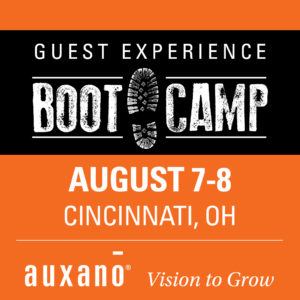
Develop Specific Training to Produce Engaged and Guest-Focused Leaders
How does Disney develop the world’s most engaged, loyal, and Guest-centric employees, year after year?
The simple explanation for Disney’s success can be attributed to the levels of support and clarity of purpose found in Disney’s employee training.
Training cannot be limited to ‘Here’s what you need to do, now go do it.’ That’s not good enough.Training needs to instill a spirit, a feeling, an emotional connection.Training means creating an environment of thinking and feeling.
– Van France, founder of Disney University
The message from Van France and the many who worked with him is unwavering. Success is predicated on the following:
- Having a seat at the leadership table
- Being a valued part of the organizational culture
- Moving well beyond providing merely short-lived programs
- Being incessantly creative and willing to try new approaches to keep the message relevant, fresh, and engaging
THE QUICK SUMMARY – Disney U, by Doug Lipp
When it comes to world-class employees, few organizations rival Disney. Famous for their friendliness, knowledge, passion, and superior customer service, Disney’s employees have been fueling the iconic brand’s wild success for more than 50 years.
How has Disney succeeded in maintaining such a powerful workforce for so many years? Why are so many corporations and executives drawn to study how Disney continues to exemplify service and leadership standards?
The Disney University, founded by Van France, trains the supporting cast that helps create the world-famous Disney Magic. Now, for the first time, the secrets of this exemplary institution are revealed. In Disney U, Doug Lipp examines how Van perpetuated Walt Disney’s timeless company values and leadership lessons, creating a training and development dynasty. It contains never-before-told stories from numerous Disney legends. These pioneers share behind-the-scenes success stories of how they helped bring Walt Disney’s dream to life.
To this day, the Disney University continues to turn out some of the most engaged, loyal, and customer-centered employees the business world has ever seen. Using the lessons outlined in Disney U will set your organization on a path of sustained success.
A SIMPLE SOLUTION
After Disneyland had been open for seven years, Van realized the 1955 model of orientation and cast member training that had been so successful during Disneyland’s early years was no longer sufficient. He faced a paradox: preserving the past while preparing for the future.
France knew that he needed to identify and preserve the components of orientation and training that had led to such heady success during Disneyland’s first seven years:
- Friendly environment
- Creative presentations
- Useful content
He had to balance these fundamentals while preparing cast members – including managers – for a much more complex future, driven by the following factors:
- Consistency – everyone must attend the new-hire orientation program
- Systems – specific on-the-job training must follow the orientation program
- Continuing education – supervisors and managers needed leadership and communication- skills training
The time was right for Van to build a bridge to the future of training for Disneyland. The time was right for the Disney University.
Even the lowest-tech, bare-boned and budget-challenged training program will get the job done as long as hearts and minds are captured. Training programs reflect organizational values and health.
Despite the resources at their disposal, too many training departments struggle to provide an educational experience that survives beyond the walls of those very classrooms or the pages of their training manuals. And too many training departments fail to get employees’ support of concepts, strategies, guidelines, rules, regulations, ideas and procedures presented during training. To overcome these problems, the heads of organizations and training departments might first address these questions:
- “Why aren’t the standard operating procedures of our company followed?”
- “Why is it so hard to sustain the momentum we had during training?”
- “Does the training team have a seat at the corporate table?”
The content of training programs, the individuals who teach, the employees who attend, and the way employees are supported outside the classroom reveal much about organizational culture. Many organizations would benefit by simply looking at what their training activities (or lack of training activities) are telling them.
1) Is innovation encouraged? To what extent is creative, out-of-the-box thinking fostered, both in the training environment and on the job?
2) Is organizational support found at every level? Are leaders, from C-level executives to front-line supervisors, aligned with the training team? Is their support overt and enthusiastic? Do Operations and Training staff collaborate to ensure effectiveness of content and delivery methods?
3) Is employee education valued and non-negotiable? Or, is training the first thing cut when budgets are tight?
4) Is entertainment incorporated into training and education initiatives? Is training engaging and practical? Are experiential training techniques that have enough “shock value” (simulations, role-plays, exercises) employed to get maximum involvement from all trainees … even the introverts? Entertainment, effectively used, has a place in virtually any training environment; it helps transform theory into action and boring into memorable.
Yes, the Disney University benefits from having iconic mascots such as Mickey Mouse and Donald Duck. More important, the Disney University enjoys the Four Essentials outlined above. How many of these Essentials does your training team enjoy?
– Doug Lipp, Disney U
A NEXT STEP
What Are Your Circumstances?
Identify: How do you set the stage for success to ensure sustained enthusiasm for team development?
- What values in your organization are nonnegotiable? Identify them.
- Why are those values in place?
- What benefits do the values provide your organization and team members, even the parking lot greeters?
- Which values are the strongest? Which are the weakest?
Apply: How are the values of your organization brought to life?
- How are they communicated to team members? How often? By whom?
- Does everyone know the values?
- What happens when these values aren’t upheld? Are there consequences? Exceptions?
- How can the values be more effectively conveyed throughout your organization?
Training leaders to be Guest-focused has to be an inside-out proposition (starting from your core values) with top-down implementation starting from your senior leadership team. Set aside time in your next team meeting to review your values and craft a next step for including Guest welcoming training as you:
- Hire new staff;
- Meet regularly with staff and leadership teams;
- Recruit new volunteers in each ministry;
- Welcome members into your church
We have drawn exclusively from the Disney organization to demonstrate how to create a memorable Guest Experience because they are an unquestioned leader in creating an unforgettable first impression. We understand why some organizations may be reluctant to use these concepts, but take a moment to think beyond the Disney organization to focus on the potential impact of the principles suggested above.
Creating a memorable Guest Experience is an important first step in your next first-time Guest returning again, and prayerfully realizing the transformational power of Jesus Christ as a fully-involved member of your church.
Taken from SUMS Remix 20-3, published August 2016
This is part of a weekly series posting content from one of the most innovative content sources in the church world: SUMS Remix Book Summaries for church leaders. SUMS Remix takes a practical problem in the church and looks at it with three solutions; and each solution is taken from a different book. As a church leader you get to scan relevant books based on practical tools and solutions to real ministry problems, not just by the cover of the book. Each post will have the edition number which shows the year and what number it is in the overall sequence. (SUMS provides 26 issues per year, delivered every other week to your inbox).
Want to learn more about training your teams? Check out Auxano’s Guest Experience Boot Camp in Cincinnati, OH on August 7-8.


Tags: Disney U, Doug Lipp, Guest Experience, Guest Experience Boot Camp, Guest Experience Training, SUMS Remix












